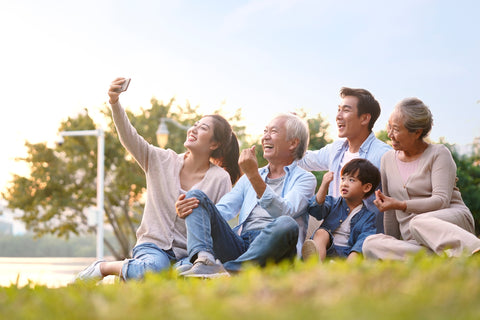Lifestyle in Japan - A Day In The Life
When you think about Japan, you probably think of sushi and karaoke, right? Well, sure—but that's just the tip of the iceberg.
Japan is an incredibly unique place. It's a country that holds on to its traditions and customs, but also has a culture that values the newest technology and innovation.
The Japanese philosophy is to work hard, but also know how to unwind and enjoy themselves. The pace of life can be slow and relaxed. As a result, people are less stressed than those living in other countries, especially when it comes to getting things done. The Japanese don't like to rush; they prefer to take their time when doing things and value efficiency over speed. Japan has a strong work ethic and takes pride in its reputation for being able to complete tasks as efficiently as possible. There's no doubt that this helps them maintain their high standard of living.
If you want to know more about the Japanese lifestyle and what daily life in Japan looks like, keep reading!
Japanese food culture

Traditional Japanese food culture is a rich and diverse experience that is based on the idea that food is one of the most important parts of life. The Japanese have a rich history of food-based rituals and practices, and it's not uncommon for people to travel thousands of miles just to sample a new dish or experience. In fact, many travel itineraries are centered around food alone. The main focus of most travelers is trying out some of Japan's most famous foods, such as sushi and ramen. But there's much more to Japanese cuisine than just these two dishes!
Traditional healthy Japanese food is largely based on rice, fish, and vegetables. Meat is eaten, but it's usually in small quantities and there are many vegetarian dishes to choose from. Some of the most famous Japanese dishes include sushi, sashimi (raw fish), tempura (deep-fried seafood or vegetables), yakitori (skewered chicken), tonkatsu (breaded pork cutlets), miso soup, and ramen (noodle soup). Green tea is often served after a meal to help digest as well.
Japanese food culture is extremely diverse and varied, but there are some core principles that guide Japanese cuisine. First of all, Japanese food is usually very healthy—the Japanese diet is rich in vegetables and seafood, with fewer processed foods than other types of cuisine. The traditional Japanese diet also prioritizes balance over calorie restriction: even when you’re eating something sweet or indulgent, you shouldn't feel guilty about it because the overall balance of your meals will be good for your body! Another important aspect of the traditional Japanese diet is that it focuses on fresh ingredients rather than processed ones.
Japanese religion and beliefs
Japan is a country with a rich and diverse religious history. The two major religions in Japan are Shintoism and Buddhism.
Shintoism is the oldest religion in Japan, originating from the worship of nature gods. It is an animistic religion that believes in many gods who can be found everywhere in nature. Shintoist shrines can be found throughout the country, especially at the entrances of homes or businesses.
Buddhism was brought to Japan from China around the sixth century CE and eventually became one of the most dominant religions in the country by the eighth century CE. Buddhist monks were very influential in Japanese society during the medieval period, as they performed many important tasks such as writing texts on subjects ranging from history to philosophy.
Japanese holidays and events

Japan has a rich and varied cultural heritage. In addition to traditional festivals and events, Japan has many holidays, some of which are observed by the whole nation while others are confined to a particular region or city. These days are an important part of Japanese culture and tradition.
In the winter months, there are many festivals in Japan. Some are religious festivals that are celebrated with prayers and offerings, while others are cultural festivals that feature traditional music, dance, and crafts. Many of these festivals have been around for centuries.
Hanami, for example, is one of the most well-known Japanese festivals that takes place around mid-April every year when people gather together to enjoy cherry blossoms at parks or along riverbanks across Japan. It is believed that during this time, people can gain enlightenment by looking at flowers. August brings Obon season: a time when people return home to visit their ancestors' gravesites, eat traditional foods like tempura and sushi rolls, dance around bonfires (called Bon Odori), or take part in other festivities around town or at local temples or shrines.
The most important holiday in Japan is Shogatsu, or New Year's Day (January 1st), which marks the beginning of a new year according to the lunar calendar system used by many Asian countries. It's a day for families to gather together for celebrations at home or at work places where everyone exchanges gifts among each other – oftentimes including an envelope filled with money inside it. This is celebrated by eating a lot of food, drinking sake (which is rice wine), praying and wishing for good fortune in the new year, and going out with friends or family.
If you’re interested in the delicious treats eaten during these celebrations, discover our Japanese snack box subscription that features authentic snacks straight from Japan!
Japanese family life

In Japanese culture, family is an integral part of life. The Japanese believe that a strong, close-knit family will lead to a stable and happy society. Family members are expected to support each other in times of need as well as during times of prosperity.
The traditional Japanese family consists of three generations: grandparents, parents, and children. The grandparents live with or near their children’s families. In some cases, the grandparents may live with only one of their children’s families but still maintain close ties with all their grandchildren.
The parents have a great deal of influence over their children’s lives. They decide where their children will go to school, what sports they should play (if any) and who they should marry (if any). They also teach them how to behave properly in public settings such as restaurants or stores so they don’t embarrass themselves or others around them by doing something inappropriate.
Common hobbies to get into

There are a number of hobbies and pastimes that are uniquely Japanese. Reading is extremely popular, with manga being one of the most well-known genres of comics in the world.
Gardening is also a popular hobby in Japan, especially during summertime when temperatures rise and people have more time on their hands after school lets out for vacation. While it's a way to relax and enjoy the outdoors, it also has other benefits. Gardens can be beautiful places to visit, whether they're small private gardens or large public ones like Ryoanji Temple's rock garden in Kyoto.
Listening to music and karaoke are two of the most popular hobbies in Japan. Karaoke is a Japanese word, but it’s been around for a long time: it was first invented in 1974 by Daisuke Inoue. He wanted to appeal to people who liked singing but didn’t want to do it alone, so he made something called “karaoke,” which means “empty orchestra.”
Cooking is another popular hobby in Japan. Many people enjoy cooking as a way to relax and unwind, while others do it as a creative outlet or to explore new cuisines. Cooking classes are offered at many hotels, restaurants and museums throughout Japan. These classes are usually taught by professional chefs who will show you how to make delicious Japanese dishes like sushi rolls or tempura vegetables.
Going to the movies is a popular pastime in Japan. Many people go on the weekend, and there are many theaters around town. Theaters are usually very clean and well-kept, with attendants who keep an eye on things and make sure that everyone is behaving themselves. Some theaters even have attached cafés or restaurants where you can get a drink or something to eat while you wait for your movie to start!
Featured Blog Products
==https://www.bokksu.com/products/casual-tea-ceremony-set\==
==https://www.bokksu.com/products/hinoki-wooden-sake-cup-set\==
==https://www.bokksu.com/collections/best-selling-japanese-snacks-candy/products/premium-treat-yourself-box\==
Author Bio











